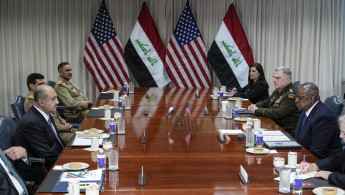Iraq's government vows to protect US-led coalition personnel, diplomatic facilities
Despite growing calls to oust American troops from the country, Iraq's top military and national security officials vowed to maintain a strategic partnership with the US.
A senior military and security delegation led by Iraqi defence minister Thabet al-Abbasi visited the United States and discussed the US-Iraq strategic partnership in combating terrorism and assisting and advising the Iraqi security forces.
The delegation included Iraq's National Security adviser, Qassem Al-Araji, the director of the Counterterrorism Service, the Chief of Defence, the Joint Operations Command – Iraq deputy commander, and other senior officials.
A series of meetings were held with top US officials, including Secretary of Defence Lloyd J. Austin, Jake Sullivan, the US national security adviser, and Alina Romanowski, the US ambassador to Iraq.
In late 2021, the Iraqi federal government announced the end of the US-led coalition's combat role. Currently, there are nearly 2,500 US troops and an additional 1,000 from other member countries in the coalition still stationed in the country, with a mandate to train and advise local security forces.
Iraq and the US signed the "Strategic Framework Agreement" in 2008 that outlines a comprehensive relationship between the two nations.
"The US Department of Defense (DoD) and the Iraqi Ministry of Defense led the inaugural US-Iraq Joint Security Cooperation Dialogue in Washington, DC from August 7-8, 2023, reaffirming their commitment to security cooperation and shared interest in regional stability," reads a joint statement by Iraq and the US. "The US and Iraqi delegations reaffirmed their commitment to developing Iraq's security and defence capabilities and determination to deepen security cooperation across a full range of issues to advance our countries' shared interest in Iraq's security and sovereignty, and in the stability of the region."
Both delegations confirmed that the mission of the US forces is "not combatant" in Iraq and that "All US military personnel remain in Iraq at the invitation of the Government of Iraq to train, advise, assist, and share intelligence in support of Iraq's fight to ensure the enduring defeat of ISIS."
The two sides also confirmed cooperation in focusing on the defeat of the Islamic State and prevent its resurgence.
They affirmed cooperation with the Iraqi Security Forces, including the Kurdish Peshmerga forces, for "a shared commitment to regional stability."
The coalition forces are stationed at bases run by Iraqi troops. This includes the Ain Al-Asad base in Anbar province, Camp Victory near Baghdad's international airport, and Harir airbase in Erbil, the capital city of the northern Kurdistan region.
Iran-backed Shia blocs and militias have asked the Iraqi government to expel the US troops in Iraq.
On Thursday, 10 August, Iraqi MP Ali Turkey al-Jamali, from the Shia Sadiqoun bloc, said that the US troops, including the advisors and trainers, should leave Iraq. He said that the Iraqi delegation was "negotiating with the killers of Qasem Soleimani", referring to the assassination of the former head of Iran's Quds Force as well as Abu Mahdi al-Muhandis, deputy chief of Iraq's Popular Mobilization Forces (PMF), who were both killed by a US drone at Baghdad's International Airport on 3 January 2020.
"The Government of Iraq reaffirmed its commitment to protecting US and Global Coalition personnel, advisors, convoys, and diplomatic facilities. The delegations noted their intent to hold subsequent Joint Security Cooperation Dialogues and related meetings in the future to discuss the evolving threat from ISIS, current and future operational requirements, and efforts to improve the capabilities of the Iraqi Security Forces," the joint Iraqi-US statement said.
"The United States and the Republic of Iraq intend to consult on a future process, separate from the JSCD and inclusive of the Coalition, to determine how the Coalition's military mission will evolve on a timeline according to the following factors: the threat from ISIS, operational and environmental requirements, and ISF capability levels."
Last year, Iraq's judiciary issued an arrest warrant for former US president Trump for ordering the assassination of Soleimani and Muhandis.
ISIS proclaimed itself as a 'caliphate' following a meteoric rise in Iraq and Syria in 2014 that saw it conquer vast swathes of territory.
The US-led coalition helped defeat ISIS in Iraq in 2017 and Syria two years later, but sleeper cells of the extremist group still carry out attacks in both countries.




 Follow the Middle East's top stories in English at The New Arab on Google News
Follow the Middle East's top stories in English at The New Arab on Google News

![A group of Palestinians, foreign and Israeli activists gather to participated in an olive picking event on the land in the town of Battir, which is under threat of confiscation by Israel in Bethlehem, occupied West Bank on 8 November 2024. [Getty]](/sites/default/files/styles/image_330x185/public/2182930803.jpeg?h=199d8c1f&itok=__0LgGsa)
